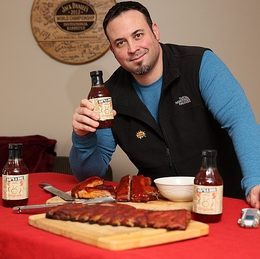
The likes of Kansas City, Memphis and North Carolina—the country’s strongholds of smoked and barbecued meats of every sort—now have some unexpected company: Philadelphia. Led by restaurants such as Stephen Starr’s Fette Sau in Fishtown and Michael Solomonov’s Percy Street Barbecue in Washington Square, the city is quietly becoming something of a barbecue mecca.
In fact, at least one very qualified source suggests Philadelphia—or, more precisely, the suburb of Lansdale—has given rise to some of the world’s best barbecue, thanks to a 43-year-old pit master named Bob Trudnak.
In November, Trudnak competed in the World Food Championships in Las Vegas under the team name BBQ Guru. Here he went head to head with dozens of championship-caliber teams and took the crown in the ribs category. The win effectively gave him bragging rights to the world’s best ribs.
“I told them anyone who wins a category should get a championship belt,” says Trudnak, who placed 40th overall in the four-day event’s World Barbecue Championship. “There were a lot of great teams there, and it’s anybody’s ballgame. … I’m always there to win.”
Trudnak’s journey toward becoming a regular on the competitive barbeque circuit began in 2005, at an event held on the grounds of the since-demolished Veterans Stadium. He now competes regularly—and, more often than not, he wins—in contests throughout the country, earning high marks from judges and devotees alike.
His perspective on great barbecue comes down to a single word: balance.
“It’s about understanding the meat you’re cooking and balancing the flavors,” he says. “There are a lot of types of barbecue in the country: Texas vs. Kansas City vs. Carolina. Texas is smoky, Kansas City is sweet, and Carolina is vinegar and tangy. I’m not any of those. I have an open range, and in my opinion taking the best of all those gives me the upper hand. It’s just taking the best of all those regions and creating a whole new flavor.”
Although he’s no professional chef—formally, he’s marketing director for a Warminster-based company that manufactures, among other things, temperature controls for charcoal grills and smokers—cooking has been a love of his for as long as he can remember. Growing up he learned to cook the cuisine of his Italian heritage, though he was “always pressuring” his parents to buy a charcoal grill. He was 7 the first time he cooked outdoors.
“I always heard my grandfather and father talking about catching crayfish from the stream and cooking them in a coffee can,” he recalls. “So I went down to the local stream, caught a bunch of crayfish, then took the Folgers can out of the freezer and dumped the coffee in the trashcan. I built a wood fire in the backyard and cooked the crayfish. When my dad came home I didn’t know if he was going to hug me or kill me. … [The crayfish] were delicious, even though I didn’t have any drawn butter.”
Competitions are by no means the only place to enjoy Trudnak’s barbecue. Although he does not yet have a commercial kitchen to his name, he’s always behind the grill at neighborhood block parties, and he has begun to share his barbecuing prowess with the masses through small catering jobs. Also, as of last November, one of the secrets to his success—his own brand of barbecue sauce, BBQ Bob’s Hav’n a BBQ—is now available for purchase at select retail stores and through his company’s website, bbqguru.com.
“It’s the same philosophy as the way I cook,” he says. “I’ve taken all the best flavors people love about regional barbecue and put them in a bottle. First you get the sweet notes, then you get into the herbs and spices, and then you get a touch of vinegar. … My philosophy is you balance it so well that no one can tell you what they don’t like about it.”
Trudnak admits to being a “picky” guest at restaurants, where he prefers to indulge small plates featuring “little morsels of really flavorful food.” If pressed to choose a dish for what might be a last meal, he says he would choose something simple: “Really good sharp cheese, olive oil, bread, red wine—I’m happy.” For him, however, food represents an opportunity to share his gift.
“I love feeding people, and I love creating, because I’m a creative person,” says Trudnak, who earned his undergraduate degree in photography. “I love seeing people’s faces when they eat my food. … Because I cook barbecue so much, I don’t eat much barbecue. I cook for other people, and I cook for results.”


